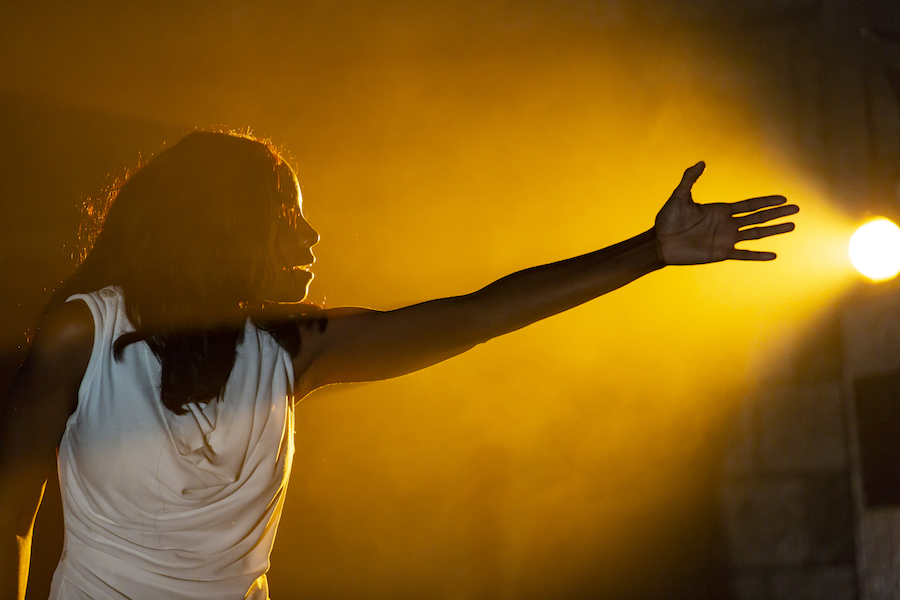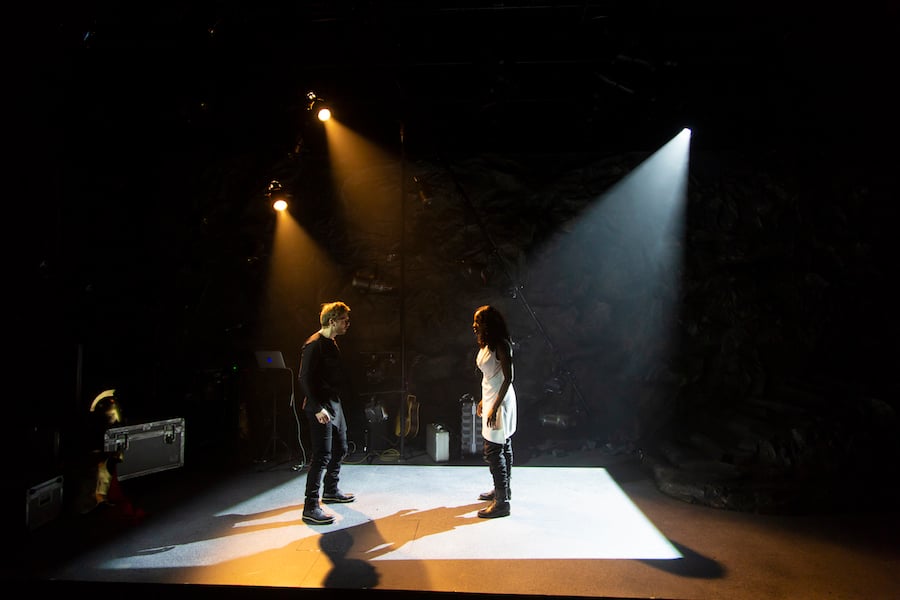
Long Wharf Theatre | Arts & Culture | Theater
.jpg)
| Rachel Christopher as the poet in An Iliad. T. Charles Erickson Photos. |
The poet is listing off the places that soldiers have come from to fight. Ohio. Kansas City. Miami and the Bronx. Texas. Flint, Michigan, and Escanaba too, so far up into the Upper Peninsula it’s almost Wisconsin.
“We’re talking tens of thousands of men emptied out from the Greek isles,” she says. And in the audience we pause, unsure of what country, what century, what conflict she’s even referring to anymore.
It’s one of the ways Long Wharf Theatre nails Lisa Peterson and Denis O’ Hare’s An Iliad, running now through April 14 at the theater's Stage II. Directed by Whitney White with a standout performance from Rachel Christopher, the play offers a stunning and wholly unexpected adaptation of Homer’s epic poem with modern verse that brings the Trojan War home.
Tickets and more information are available here.
Based in part on Robert Fagles’ 1990 translation of The Iliad, the work starts in the same place that the poem does, with the argument of Achilles and his King Agamemnon in the final years of the Trojan War. In a conflict that started over a girl, soldiers hardly know why they’re fighting anymore.
.jpg)
But they are—brave Achilles and Patroclus with the Greeks, honorable Hector/Héktōr with the Trojans. Agamemnon, like every leader in recent history, has chosen to command his troops from a safe distance. All of them are strong and brave and obstinate as hell. As they trade the wisdom of their wives and mothers for instruments of death, they set a precedent for manmade conflict that will last the course of human history.
There is no poetry in battle, but there is a lot on this stage, transformed by designer Daniel Soule into an airport terminal, walled city, and rocky terrain that could be anywhere. The prologue primes us for traumas that seem eerily familiar: bloodshed on the battlefield, humiliation and torture of one’s enemies, bodies that are plagued, stabbed and dragged through the dirt in partisan victory. This is Troy, as it loses its peace and stability, and is ransacked right into the ground.
Or is it Baghdad? Constantinople? Huế? Damascus? The longer we look and listen, the more unsure we become.
As worlds collapse in on each other, White directs with an immediate and sustained sense of propulsion. She has found a gift in her Poet (Christopher), who stakes her territory with her first breath. She may speak Greek, but she also speaks English, enough to blow over the fourth wall with her words and keep on going. She, like Homer, has a knack for a good list, and she’s going to use it—while throwing her world for a loop.

From the moment Christopher locks eyes with the audience—and she really does get to every face staring back in the theater—she is stark and commanding. Her voice rings the theater into being; it fixes itself fast to hearts and minds, then begins to trade Greece for Iraq, armor-plated men for frightened boys in the trenches. The play’s language seems tailor-made for this, a mix of modern English, ancient Greek and twentieth-century translation.
There’s something relaxed and colloquial in this performance too, splitting the poem wide open so she can share its geode-like core with us. She vodka-toasts the gods on Olympius, takes her time with exposition, she calls for a muse (Zdenko Martin), who grudgingly shows up with his guitar and looping pedals. She jests verbally—sometimes with a timing more like Jessica Williams than a Greek poet—letting the audience in on an inevitable grim humor and discomfort of war. She sinks into the heartbeat-like thrum of Martin’s accompaniment, and then becomes fierce and fiery as it builds.
Fagles, who died in 2008, was praised by the New York Times as having a translation “couched in the spoken language, yet not colloquial; it is plain and direct, noble, above all rapid.” Almost three decades later, Peterson and O’Hare have used it to build worlds and knit them together until one cannot exist without another. White’s direction pushes it further by placing a woman of color in the poet’s role—a move that feels so intuitive it’s astounding to think of O’Hare in the role just a year ago.

If there’s a feminist tilt here, it’s a very intersectional one. In The Iliad, Helen of Troy is a foil: her one job is to be so beautiful that she can catalyze a war. Christopher denies Homer—and the audience—that time-honored tradition. Instead, she shows her audience the horrors of war, eerie and stunning under Kate McGee’s lighting design. She shape-shifts into Hector and then hardens into Patroclus; she turns from a vengeful, furious Achilles to King Priam, made small and begging for the body of his son. She is Trojan one moment and Greek the next, blurring the lines between aggressor and victim, he who has stolen life and he who is owed reparations.
The performance, to which Martin adds a reverb-drenched heartbeat, is a revelation. It has an Achilles’ Heel—a moment that drags out the play minutes past its end point, not unlike the corpse of poor Hector—but its strengths are far greater. The Poet teaches us that Patroclus, so taken by the thrill of bloodshed, exists in every civilization, quietly learning to fetishize state-sanctioned violence until he has come to blows. She shows us the through line that a shining shield has to a gas tank, a spear to the sharp end of an Uzi. She guides us through history without ever inserting herself into the story, simply because she does not have to.
But what becomes of her?

